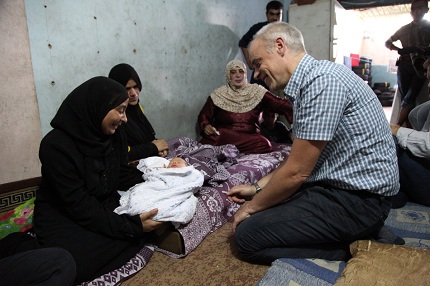Syria crisis - a time of tears
9 months after his last visit, Justin Byworth is back in Beiruit and describes firsthand what Syria’s descent means for its mothers and fathers, sons and daughters.

I’m back in Beirut, nine months after my last visit to Lebanon. All that has changed in the UK since then is the turning of the seasons. The huge changes here in that short time threaten to tear apart the fragile Lebanese society. Last November there were less than 200,000 refugees, now there are a million in this country of 4 million. The complete collapse of Syria is the world’s largest humanitarian crisis this century and yet to many of us it’s little more than a media headline that comes and goes depending on British and international politics and the latest celebrity or sports news.
Surrounded by tears again and again today I saw firsthand what Syria’s descent means for its mothers and fathers, sons and daughters, in so many lost and broken lives just as real and precious as yours or mine and all we hold dear.
Hamed has such intensity in his eyes when he describes how he saw his mother die. “The first rocket fell in the compound, the second hit the house. My father took her in his arms, but it was too late. We ran from one place to another escaping the bombs, we couldn’t even bury her because they were hitting the cemetery”. His father Brahim, wept quietly beside me as Hamed spoke. Not so quiet was the wailing of Hamed’s grandmother Mariam as she told of the death of her brother and sixteen family members in the chemical attack that shocked the world and of four surviving relatives who are “between life and death – waking up sick and trembling”. Abdullah, just behind me cries “Look at me, I am a stranger in a land I don’t know and my children are lost. My three boys were taken, and my five beautiful girls are homeless somewhere in Syria”. My Lebanese colleague, Patricia, who’s seen so much of this over the past two years, quietly wipes away her own tears.
From the crowded, dilapidated old office block floor that serves as home to Hamed and 200 other refugees to a cramped, unbelievably grimy room behind stacks of car tyres at the back of a garage to meet the family of tiny Youssef, new to the world just 48 hours ago. His mother Safa, who is clearly still in pain with cramps, gave birth to him here with no medical help and Youssef’s 2 year old brother Said lies asleep feverish beside them. The poor hygiene is palpable, my shirt sticking to the oily wall as I lean back. Grandmother Shahira tells an almost biblical story of moving ten times in Syria over two years before coming here and with two disabled young men as sons, how they were told “No more room, no more room, we can’t take any more” in place after place. As unregistered refugees they received no assistance until a neighbour brought World Vision to see them. Shahira and auntie Noura speak with passion and tears “We are Syrians, we have lost our country.” “We are hungry, scared and none of my children have seen school in more than two years. Take care of your country!”

As Safa passed tiny newborn Youssef into my arms I found myself telling them how my daughter Maia’s birth was followed within days by the death of my wife Mischka’s father and how I recognise the bittersweet experience of rejoicing and grieving at the same time.
Thank God that we can also do something to increase the rejoicing and reduce the mourning. What a privilege to be a part of World Vision’s response to the Syrian crisis. Shahira told us today “If it weren’t for the [relief] card, I don’t know what we’d have done”. El Ham, mother of seven said “Thank you World Vision for being honest. You said you would help us and you have.”
There is so much more to tell from today. World Vision’s new water and hygiene programme for the Syrian refugees, funded by the British government; Our innovative e-card method of providing basic relief to unregistered refugees; The local Sheikh who is committed to bringing Christian and Muslim, Sunni and Shia together to build peace; World Vision’s fantastic Lebanese staff – so committed, capable and caring.
As we take our leave I watch as little Aiya leans across to kiss her weeping Grandmother. The child is rewarded as the old lady’s tears are replaced by a smile. Together, with your help, we can help to keep the tears away.
Such a moving account from Justin, but so wonderful to hear how the generosity of World Vision supporters can help those Syrians who are displaced smile. You can help make a difference today by donating to our Syria Crisis Appeal